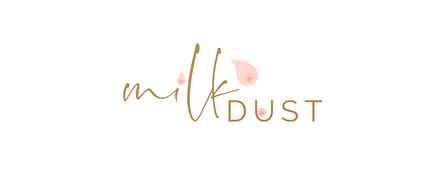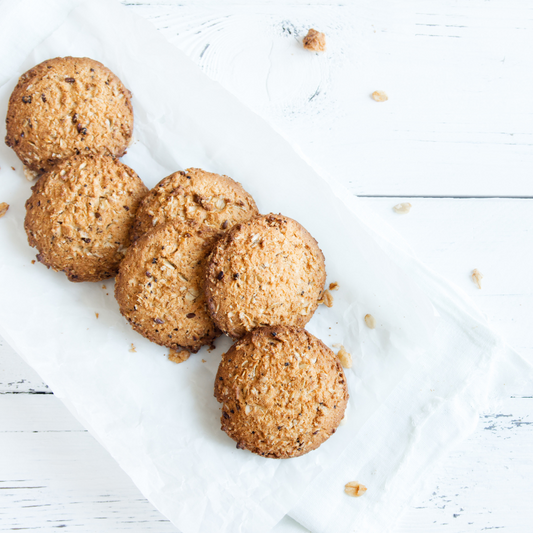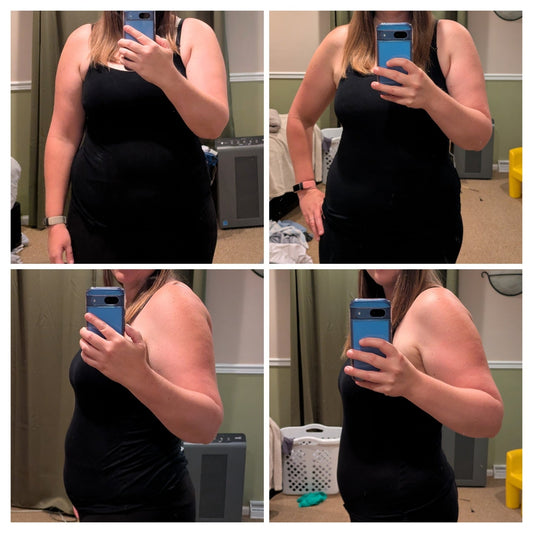Andrea Tran RN, BSN, MA, IBCLC
It’s a fact of a healthy pregnancy that you will gain some weight that is fat. Most women want to lose that extra fat as soon as possible. A breastfeeding mom wants to make sure that any weight loss program she uses is safe when breastfeeding. Safety of a weight loss program, while you are a nursing mama, is not only from the effect on milk supply. If you want to skip to Milk Dust's FREE 10-day program, it is a nutrient-dense diet plan that allows breastfeeding mamas to lose weight, without losing milk supply!
The American Academy of Obstetricians and Gynecologists (ACOG) recommends a weight gain of 25 to 35 pounds for a woman who starts pregnancy with an average weight and who is pregnant with a single baby. Of course, if there is more than one baby, there will be more weight gain. Underweight women are advised to gain more, and overweight and obese women are counseled to gain less.
The reason for the difference in recommendations is how much fat stores a woman has when she gets pregnant. Approximately seven pounds of the average pregnancy weight gain is fat. Your body is storing the fat so you’ll have energy for labor and breastfeeding.
How Much Weight Should I Lose From Breastfeeding?
Typically, a woman loses one to two pounds each month while breastfeeding. If you gained an average amount of weight, this means you would lose the extra weight from fat in three to six months. If you gained an above average amount of weight, it will take longer. There are some things that you can do with your diet and exercise routine to help speed weight loss up.
While it is safe to lose weight a little faster than average, rapid weight loss is not recommended because most mamas do not properly fill their plate with nutrient-dense foods. This is why Milk Dust Protein Powder and Lactation Bars can be such a huge help. If you really want to lose weight fast, the shake and bars offer important nutrients that breastfeeding mothers need to heal, keep up milk supply and feel their best.
What Are The Concerns About Rapid Weight Loss While Breastfeeding?
The two primary concerns with rapid weight loss are milk supply and the release of toxins from fat stores.
Milk supply works primarily on supply and demand. But some women do struggle with making enough milk, and restricting calories could potentially result in a decreased milk supply. Some moms have sensitive milk supplies and see their production drop with the slightest changes in hydration, caloric intake, or how long they go between feedings. This is why Milk Dust's program focuses on nutrients, rather than calorie restriction. It is a great, simple program that has worked for many mamas!
Other mothers make tons of milk, and even if their supply decreases, they still make a lot of milk. For this reason, you can’t assume that your milk supply will not be affected because someone else followed a particular weight loss program and still had a good milk supply
The other concern has to do with toxins. People are exposed to toxins on a regular basis from the environment, foods and beauty, and skincare products. When we burn fat, the toxins get released into our bloodstream and can make its way into breast milk. More rapid fat burning could potentially result in higher levels of toxins in your breast milk.
Safety of Popular Weight Loss Programs While Breastfeeding
Weight Watchers (Now called WW) and breastfeeding
WW is a good option for breastfeeding women. You have a certain number of points you are allowed to eat each day and week. They take your breastfeeding status into consideration when determining your point allocation.
On WW you can eat whatever you want. There are no restricted foods. You will want to focus on nutrient dense foods as opposed to processed foods or empty calories, which can be tricky when you are also counting calories.
The other positive thing about WW is they adjust your point allocation according to whether you are exclusively breastfeeding or if your baby is getting nutrition from other sources. You can download the WW app, and it will make all these calculations for you.
BUT, it is important to note that not all calories are processed the same in your body. Most of the WW colors offer 0 points for fruits and veggies to encourage women to eat highly, nutrient-dense foods. This is really important for breastfeeding mamas because it is the nutrients that fuel your milk supply more than the calories.
Milk Dust is also low on the point-system, at only 100 calories per serving and 15 grams of protien, so it can easily fit into your point system every day!
WW has you do an assessment that is personalized, and based on your answers, they recommend one of their three programs which are assigned a color. WW is a paid program.
Keto and Breastfeeding
The keto diet is low in carbohydrates and high in fats with an emphasis on high quality protein consumption. You are not supposed to eat grains, starchy vegetables, fruits that are high in sugar, sugar, or other natural sweeteners like honey, agave, or syrups. The goal of the diet is to maintain a state of ketosis.
There are only a few scientific research articles on breastfeeding moms who follow a keto diet. One study compared women who ate a low carb and high fat diet for eight days and then switched to a high carb low fat diet for eight days. The results showed milk production was not affected by mothers who ate a high fat diet. There also was no change in the amount of lactose and protein in their breast milk. Their milk had higher amounts of fat, and their infants ate more (Source).
A keto diet appears to be safe during breastfeeding in terms of supply. We don’t know what the effect is on the release of toxins. There has been one published case of severe ketoacidosis in a nursing mama that was attributed to her strict keto diet (Source).
Many people who start a keto diet describe a period of not feeling very good. This is called “keto flu.” For this reason, it is probably not a good idea to start a keto diet in the early months of breastfeeding when the average mom is dealing with sleep deprivation.
It’s also important to pay close attention to staying well hydrated and listening to your body. Make adjustments if you are not feeling good on a keto diet.
In addition, the keto diet can flush water and electrolytes from your system because of the lack of carbs to retain water, so if your milk supply is sensitive to hydration, that could be a factor to consider or monitor.
Milk Dust is also super keto-friendly, with just a few carbs per serving and very little impact on blood sugar! You can blend it with higher fat milks to make a delicious keto lactation shake!
We have a more in-depth post on the keto diet below, if it is something you are highly considering, or has worked for you in the past.
Jenny Craig and Breastfeeding
Jenny Craig is a diet that involves a prepared meal plan as well as coaching. They do make allowances for breastfeeding moms and tailor it to the age of your baby and how often he breastfeeds. No food groups are restricted, which keeps the nutritional profile larger.
Moms are required to be at least six weeks postpartum before starting Jenny Craig. Nursing moms are encouraged to limit weight loss to ½ to 1 pound each week - mostly because of very general health and safety concerns. Of course, every mother is different, and if you have a lot of weight to lose, you can lose more faster.
Jenny Craig can be a good option for the mom who has the money in her budget for the program and who struggles to find time to make nutritious calorie conscious meals. Meals are made for you, so there isn't a lot of thinking involved, but it could be difficult to stay on for a long period of time.
Getting into a habit of making nutrition meals is important for long-term weight loss, but the difficulties of cooking and preparing with a newborn are so real! I do highly recommend the
Milk Dust smoothies (get their free recipe
Ebook!), and the
lactation bars if you are low on time and energy!
Intermittent Fast and Breastfeeding
The challenge of evaluating Intermittent Fasting (IF) and breastfeeding is that there are so many different ways to do IF. Different schedules include 12 hours of fasting and a 12 hour eating window and increasing hours of fasting to alternate day fasting and other combinations. Most sources discourage intermittent fasting while breastfeeding, but that doesn't mean it won't work really well for you.
Intermittent fasting has many benefits for the body. Giving your digestive system a break from food allows it to properly calibrate hunger, which is a major challenge for breastfeeding mamas.
One of the main benefits of intermittent fasting is that hunger signals become more controlled. The first few days can be an adjustment, but once the body gets accostomed to not having to ALWAYS eat, it is easier to understand when you are truly hungry.
The long period of time without eating is not an issue for breastfeeding, assuming that the eating window supplies enough nutrients and calories to sustain hormonal function. If that is the case, intermittent fasting can sometimes be the fastest path to weight loss for breastfeeding mamas.
Whatever diet plan you choose, it is important to follow these guidelines:
- Wait until your milk supply is well established before starting a diet. This is usually by 6-8 weeks.
- Stay well hydrated.
- Since you don’t know how much milk you make, you should monitor your baby’s weight every couple of weeks.
- Listen to your body. If you are feeling low energy or having any kind of negative reaction, make adjustments to your diet.
- Be patient. It is a cliché, but it is true – it took nine months to gain the weight, and it will take some time to lose it.
The Milk Dust breastfeeding diet plan, that focuses on conquering sugar cravings and eating nutrient-dense foods is an awesome place to start if you aren't sure about any of the programs above, and want to try a program many women have had success on!



